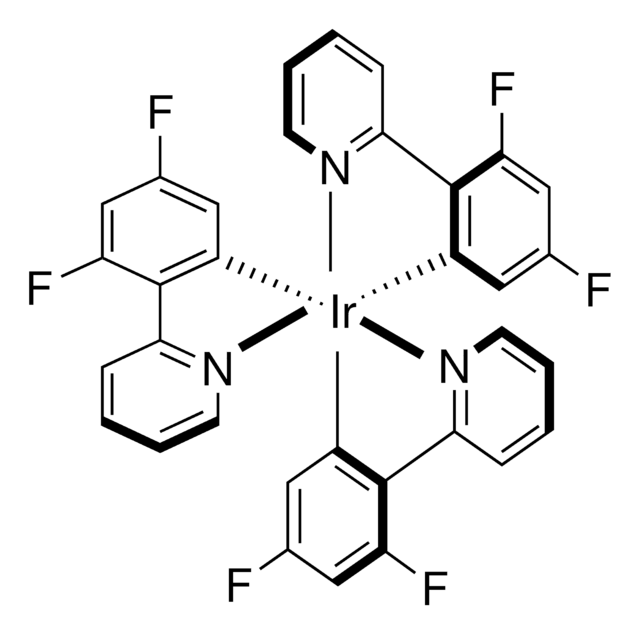904945
[Ru(dmbpy)3](PF6)2
≥95%
Synonym(s):
Tris(4,4′-dimethyl-2,2′-bipyridine)ruthenium bis(hexafluorophosphate)
About This Item
Recommended Products
Assay
≥95%
form
powder or crystals
reaction suitability
core: ruthenium
reagent type: catalyst
reaction type: Photocatalysis
mp
>300 °C
SMILES string
[Ru].n5c(cc(cc5)C)c6nccc(c6)C.n3c(cc(cc3)C)c4nccc(c4)C.n1c(cc(cc1)C)c2nccc(c2)C.C
InChI
1S/3C12H12N2.CH4.Ru/c3*1-9-3-5-13-11(7-9)12-8-10(2)4-6-14-12;;/h3*3-8H,1-2H3;1H4;
InChI key
YXZDNATXDNOJQJ-UHFFFAOYSA-N
Application
Product can be used with our line of photoreactors: Including Penn PhD (Z744035) & SynLED 2.0 (Z744080)
related product
Storage Class Code
11 - Combustible Solids
WGK
WGK 3
Flash Point(F)
Not applicable
Flash Point(C)
Not applicable
Choose from one of the most recent versions:
Certificates of Analysis (COA)
Don't see the Right Version?
If you require a particular version, you can look up a specific certificate by the Lot or Batch number.
Already Own This Product?
Find documentation for the products that you have recently purchased in the Document Library.
Customers Also Viewed
Our team of scientists has experience in all areas of research including Life Science, Material Science, Chemical Synthesis, Chromatography, Analytical and many others.
Contact Technical Service

![[Ru(bpz)3][PF6]2 95%](/deepweb/assets/sigmaaldrich/product/structures/317/925/f0ef928e-bbea-4535-abe6-dda0bc28d32a/640/f0ef928e-bbea-4535-abe6-dda0bc28d32a.png)
![(Ir[dF(CF3)ppy]2(dtbpy))PF6](/deepweb/assets/sigmaaldrich/product/structures/982/913/02dd8ddd-6deb-40a0-ab9b-07b18f1abb09/640/02dd8ddd-6deb-40a0-ab9b-07b18f1abb09.png)
![[Ru(phen)3]Cl2 ≥95%](/deepweb/assets/sigmaaldrich/product/structures/955/596/46f63eaa-39f8-4058-847d-cef0862ada92/640/46f63eaa-39f8-4058-847d-cef0862ada92.png)

2 ≥95%](/deepweb/assets/sigmaaldrich/product/structures/238/198/d2398f4d-117e-4482-8d8b-80ae657f6ea1/640/d2398f4d-117e-4482-8d8b-80ae657f6ea1.png)
![[Ir(dtbbpy)(ppy)2]PF6](/deepweb/assets/sigmaaldrich/product/structures/158/329/2544d673-d267-4aa1-8f46-2652aad4bfa0/640/2544d673-d267-4aa1-8f46-2652aad4bfa0.png)


![[Ir(dFppy)2(dtbbpy)]PF6](/deepweb/assets/sigmaaldrich/product/structures/258/715/c8fe85d5-be71-4ff1-849b-a20766636770/640/c8fe85d5-be71-4ff1-849b-a20766636770.png)
